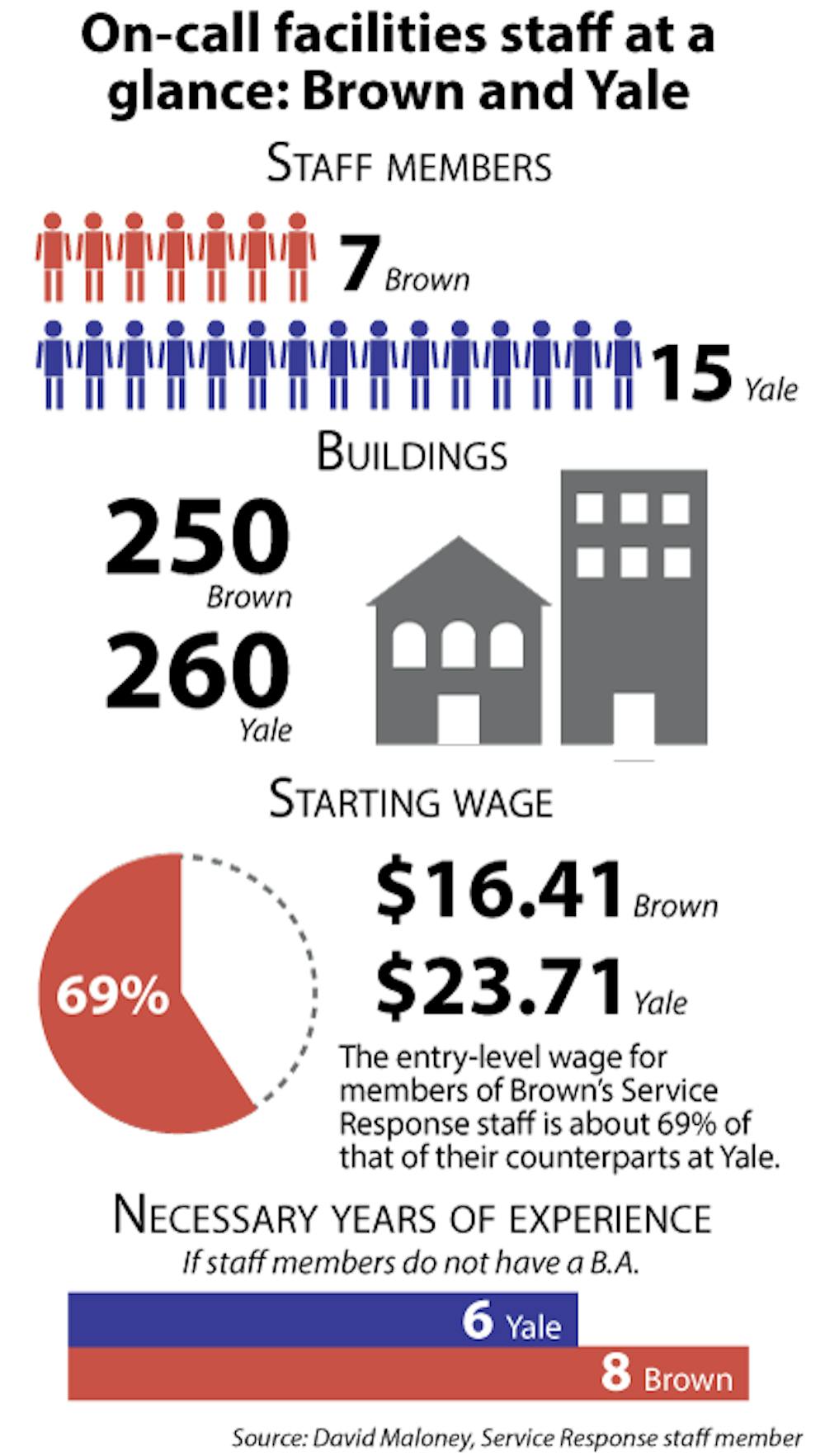The University’s Service Response staff members, who are responsible for handling immediate service needs in all 250 University buildings, have expressed dissatisfaction with low pay and understaffing relative to peer institutions. They joined the United Service and Allied Workers of Rhode Island six months ago, and they continue to seek to negotiate a new contract.
The Service Response team, which is on call 24 hours a day and seven days a week, currently has six full-time employees and one part-time employee. By comparison, Yale has 15 full- or part-time employees on its 24/7 Facilities Operations Customer Service team, which services a similar number of buildings. The starting salary for a full-time employee on the Service Response team is $16.41 compared to $23.71 at Yale, which has slightly less stringent hiring standards.
Paul Mancini, director of labor and employee relations, declined to comment on the negotiations because they involve “personal compensation levels … for a small number of individuals.”
USAW-RI represents much of the University’s Dining Services, Facilities Management and library staff. The union supported library workers in their ongoing contract negotiations with the University in spring 2014.
“The basic idea is to put Service Response along with other groups in the bargaining unit,” said Karen McAninch ’74, business agent for USAW-RI. Service Response staff members are slated to make less based on the current status of negotiations, which prompted the union to research pay practices at other institutions, McAninch said.
To try to prove that they are being underpaid, members of the response team compared their salaries to those of other University workers whose operating manuals were less extensive but who made more. David Maloney, a Service Response staff member, said the University did not feel as though the comparison was accurate.
The union hired a third-party company to compare salary grades on a nationwide scale to companies and institutions with similar job titles and descriptions, Maloney said. But the University did not accept the third-party company’s figures as grounds for an accurate comparison.
Service Response team members then looked into how similar positions are filled at peer institutions, finding Yale to be the most similar in terms of size and job demands: Yale’s campus has 260 buildings, while Brown’s has 250, and the job descriptions were nearly identical, Maloney said. Both universities require either a bachelor of arts or some work experience in the field. But Brown requires eight years of experience to Yale’s six in lieu of a college degree.
The team has struggled to fulfill its duties for a long time due to chronic understaffing, staff members said. Another member of the Service Response team, who requested anonymity due to concerns about potential repercussions, said the “flexible” part-time position causes much of the problem. The person in this position is only officially scheduled to work from 8 a.m. to 4 p.m. on Saturdays and Sundays but is required to remain on call 24/7 in case anyone else falls ill or leaves town. Five people have occupied the position in the last nine years, the Service Response team member said.
“It’s attractive because it’s part-time but with full benefits, and that’s great, but once the person actually gets in here and realizes what the job entails, they are gone in six months to a year,” the Service Response team member said, adding that when someone leaves, it usually takes six to nine months to find a replacement.
Maloney said his manager told him the full training period takes “six months until you are functional and two years before you are fluent.”
Team members said Derek Henries, their supervisor, helps by taking time away from his managerial duties to answer the telephone, which the University cites as a reason not to hire another person.
Around four years ago, the University carried out a round of layoffs in Facilities. Even as some other Facilities positions were subsequently refilled, one of the Service Response team members was never replaced.
Maloney said he attempted to call in sick on Sunday, Oct. 11 but was told he needed to come to work because of the understaffing problem.
Though McAninch acknowledged that the team might be overshadowed in the union due to its small size, she said the team’s “specialized” function at the University gives it negotiating power, citing the successful April strike by technicians at the Rhode Island School of Design.





